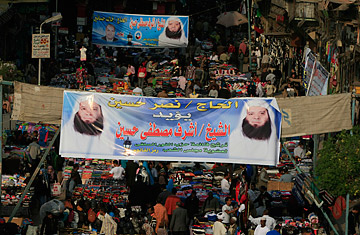
Banners supporting a Salafi candidate to the Egyptian parliament, Ashraf Mustafa Hussein, hang at a market in Cairo
(2 of 2)
Egypt's minority liberals fear an Islamist government would impose Islamic law, place greater restrictions on women and religious minorities, and leave a permanent imprint on the next constitution. The Brotherhood rejects this charge, insisting that it's committed to cross-party alliances and consensus politics; the Salafis are less persuasive.
Amid the anxiety of the sobering election outcome, there are some liberals who see Egypt's first, shaky step toward democracy as nothing to fret too seriously over. "Whatever happens, in the end, things will turn out all right because the relationship between people and authority in Egypt has changed forever," says Wael Nawara, a prominent Egyptian writer and liberal activist. The Islamists have done well in the election because they were organized, he reasons, and "maybe things will go bad for a while — even three to five years," but no future government will be able to impose radical change on the country's newly empowered masses without popular consent.
Shadi Taha, a candidate in the liberal Tomorrow Party, says the real question is whether the elected officials will be allowed to take the reins. "To be honest with you, the only group I'm really worried about, it's not the Muslim Brotherhood or even the Salafis, as crazy as they are — the only key player in this equation that I'm really worried about is the military," says Taha, whose party threw its lot in with the Muslim Brotherhood on a joint list, rather than compete against them. The ruling junta's generals are all Mubarak appointees, Taha notes, and it has always stood in the way of democratic change. "This is the real problem," he adds, "Is the military going to cede control?"
On Wednesday, in a closed briefing with a handful of mostly American reporters, the military council's General Mokhtar al-Mulla, seemed to validate Taha's concerns. The elected parliament will have only partial say in drafting the new constitution, al-Mulla said, and the military would retain some control over the process. The democratic vote notwithstanding, the general argued that parliament would not represent all Egyptians, which is why the junta's handpicked Prime Minister and an "advisory council" of intellectuals, media figures and others would oversee the constitution-writing process. The final draft would also require their approval. "The next parliament will not represent all of the Egyptian people, and the constitution will affect all Egyptian citizens," al-Mulla said. "This is our first stage in democracy. In the future, the parliament will have the ability to do whatever they like, to make any amendments."
The military's claim that its authority supersedes that of a democratically elected legislature in drafting a constitution could antagonize the Islamists, as well as many liberals — both camps took to Tahrir Square last month to protest similar proposals. But some liberals may also welcome the military's clear intention of restricting Islamist influence over the constitution-writing process. Taha believes that democracy in Egypt requires that the military back off. "If this parliament does not perform well, these people are not going to vote for them anymore. That's the beauty of it," he says. Then with a laugh: "I would have been worried about the future of liberalism if liberals had the majority today." After all, he argues, so daunting are the socio-economic challenges facing Egypt now and for the foreseeable future, that any party voted into power will struggle to maintain its allure among the electorate.
